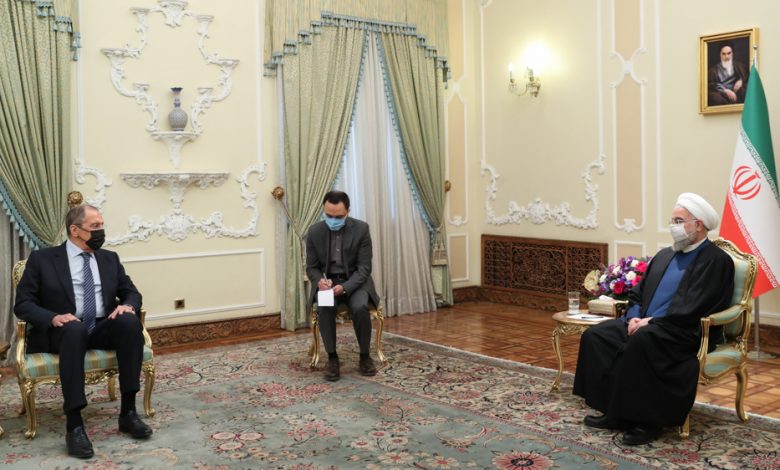Iran warns against allowing zionist regime foothold in region
Iran’s President Hassan Rouhani has told Russian Foreign Minister Sergei Lavrov that allowing the Israeli regime a foothold in the Persian Gulf region is “dangerous,” given the fact that the regime is a “destabilizing and provocative” element.

In a Tuesday meeting with the visiting Russian foreign minister, President Rouhani stressed that the security and stability of the region had to be maintained, and expressed Iran’s willingness to work with regional states toward that end.
The Iranian president also said that the expansion of regional cooperation would be a strategic measure to counter the United States’ acts of unilateralism.
He said regional security was a matter for the regional countries to take care of, and also reaffirmed the importance of the expanding defense and military cooperation between Iran and Russia since October last year, when a United Nations (UN) arms embargo on the country expired under the 2015 Iran nuclear deal.https://if-cdn.com/V4nKmcP?v=1&app=1
The United States used to be a party to that deal but unilaterally withdrew participation under former President Donald Trump in 2018 and attempted to hinder its implementation by Iran’s other partners as well. The Trump administration believed that by launching what it called a campaign of “maximum pressure” on Iran, it could force Iran to accept large-scale limits on its nuclear energy and missile work, among other things.
The administration of US President Joe Biden has verbally renounced that policy and admitted to its failure. It has also expressed an intention to return to the 2015 Iran deal.
“Today, America and the whole world have come to the conclusion that maximum pressure has failed, and America’s sole path back to the JCPOA is the termination of all sanctions [on Iran],” President Rouhani said, using an abbreviation for the Iran deal’s official name, the Joint Comprehensive Plan of Action.
The Iranian president stressed that Iran expected a full return to the contractual obligations and agreements made in 2015 and expected all parties to the Iran nuclear deal to fulfill the pledges they made that year. He said Iran would neither accept “less…, nor would it want… more.”
Even the administration of former US President Barack Obama — which negotiated the Iran deal — continued to implement sanctions against Iran, including under the so-called Iran Sanctions Act. Iran now wants all sanctions removed before the United States can return to the deal.
The Iranian president also emphasized cooperation between Iran and Russia to revive the agreement in light of the United States’ asserted willingness to return to compliance with the deal.
On Sunday, an act of sabotage targeted the electricity distribution network of Iran’s Shahid Mostafa Ahmadi Roshan nuclear facility in Natanz, which is a uranium enrichment center located in the city of the same name in Iran’s central province of Isfahan.
The Israeli regime, a staunch opponent of the Iran deal, is the prime suspect in the attack, which Iranian officials have called a bold act of nuclear terrorism on Iranian soil.
At least four Arab governments have also signed normalization agreements with the Tel Aviv regime over the past year.
In his meeting with Lavrov, Rouhani also pointed to regional issues, including the conflicts in Yemen and Syria, and stressed the importance of continued cooperation and consultations between Iran and Russia as two influential countries in the region to find a solution to those matters.
He also said Tehran and Moscow enjoyed good political and regional cooperation and urged the two sides to bolster economic relations and accelerate the implementation of joint economic agreements and projects in the fields of oil, energy, and transportation.
The Iranian president pointed to Russia’s achievements in fighting COVID-19 and its success in developing vaccines to combat the deadly disease, and said the dispatch of the Russian-made vaccines to Iran needed to be accelerated.
He also called for the launch of a joint vaccine production line in Iran.
Lavrov stresses cooperation
The Russian foreign minister said Iran and Russia aimed to expand regional and international cooperation.
Lavrov said there would be no limits to the expansion of cooperation between the two countries, including in the field of defense.
He pointed to recent talks between the remaining parties to the Iran deal in the Austrian capital of Vienna and the US’s willingness to rejoin the nuclear deal and said Moscow believed that Washington’s unconditional and complete return to the agreement and its compliance with UN Security Council Resolution 2231 would be the only solution to the ongoing diplomatic impasse over the accord.
Four days of talks between representatives of Iran and the remaining parties to the JCPOA — Britain, France, Germany, China, and Russia — ended in Vienna on Friday. The sides discussed all possible ways to revive the agreement after Trump’s unilateral withdrawal.







